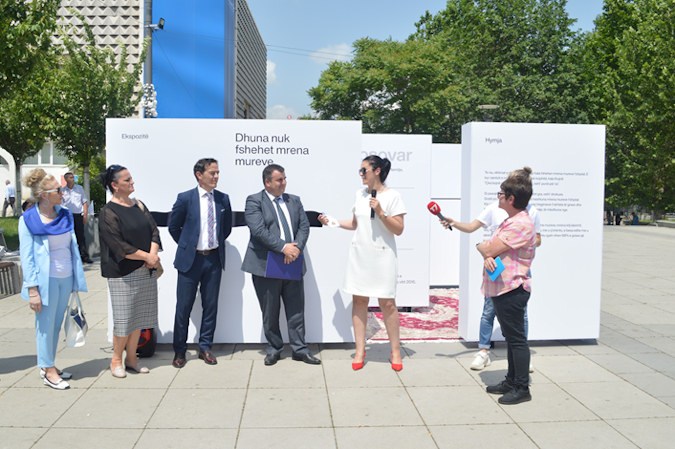An interactive exhibition in Pristina breaks the silence on domestic violence
Date:
The interactive exhibition “Break the Silence: Ending Violence behind Walls” was opened on a central square in the city center of Pristina, Kosovo[1], on 14th and 15th of June 2019, inviting visitors to break down walls surrounding domestic violence and to reach out to institutions that offer support.
Recently, Kosovo has made significant steps forward regarding its legal framework addressing domestic violence and violence against women. The criminal code has been revised, resulting in the inclusion and definition of domestic violence as a separate criminal offense, and accurately defining all acts of domestic violence and other forms of violence, in alignment with the requirements of the Istanbul Convention, for which the Constitutional Court granted full permission to be included in the Constitution as a directly applicable international legal instrument for the protection of human rights.
Furthermore, with the support of UN Women, a unified database was recently launched, enabling the monitoring and prosecution of domestic violence cases in Kosovo, and ensuring accountability by obliging relevant institutions to feed the database with the necessary information from central and local levels.
However, domestic violence still often remains hidden within the private sphere of the family, and cases are underreported. The latest survey on public perceptions of gender equality and domestic violence in Kosovo, published by UN Women, shows that 31.3% of respondents believed that domestic violence is a “family matter, so neighbors shouldn’t report it to the police”. Furthermore, nearly one-third of respondents (29.9%) perceived domestic violence as a ‘normal’ part of any relationship. Such normalization of domestic violence can minimize the severity of violence experienced and discourage survivors from reporting incidents of violence and leaving violent relationships.
This exhibition breaks down the walls of the private sphere and brings into the public space a few of the many real stories of women and men who have suffered domestic violence in Kosovo, collected by the Kosovo Women’s Network. Visitors were invited to enter a labyrinth and walk within these walls, while reading and listening to these stories. Exiting the installation, visitors could then learn more about the different institutions that offer support, as well as where to speak up against violence, ask for help, demand justice and seek economic independence.
Igballe Rogova, Executive Director of Kosovo Women’s Network, underlined that one of the main challenges in the elimination of domestic violence lies in the lack of reporting of such cases, reminding the visitors that “domestic violence is not a private issue”. Reyes Charle Cuellar, Gender Adviser of the European Union Office in Kosovo, backed this statement, emphasizing, “Domestic violence is everybody’s problem. As such, there is always an institution to report to and where to seek help.”
The exhibition meant to raise awareness on the high prevalence of cases of domestic violence in Kosovo, but also on the significance of reporting such cases, whether as a survivor or as a witness. It promoted the work of local institutions, aiming to increase citizens’ trust in them. Naim Qelaj, Deputy Minister of Justice and National Coordinator for Protection from Domestic Violence, underlined that it was indeed of the utmost importance to raise awareness on why, how and where to report.
Survivors need to know which institutions and facilities they can turn to in order to seek support. In the last ten years, a significant improvement was reached regarding the knowledge of the Law. The 2018 survey on public perceptions of gender equality and domestic violence in Kosovo showed that 23.6% of the respondents were not aware of the existence of a legal framework on violence against women and girls and domestic violence in Kosovo, compared to 44.1% in 2008. However, in 2018, only 75.9% of respondents said they would use the law to help them in situations of violence.
UN Women will continue to strengthen the work of all actors involved in combating violence against women and girls at the central and local level, including the municipal domestic violence coordination mechanisms throughout Kosovo, the police, and the judiciary. Vlora Nushi, Head of the UN Women Office in Kosovo, stated, “We must all mobilize to end violence against women and girls and strengthen the institutional response to such human rights violations and crimes.”
This exhibition was organized by Kosovo Women's Network under the framework of the UN Women Regional Programme on Ending Violence Against Women in the Western Balkans and Turkey, “Implementing Norms, Changing Minds", funded by the European Union.
[1] All references to Kosovo on this website shall be understood to be in full compliance with UN Security Council Resolution 1244 (1999).
